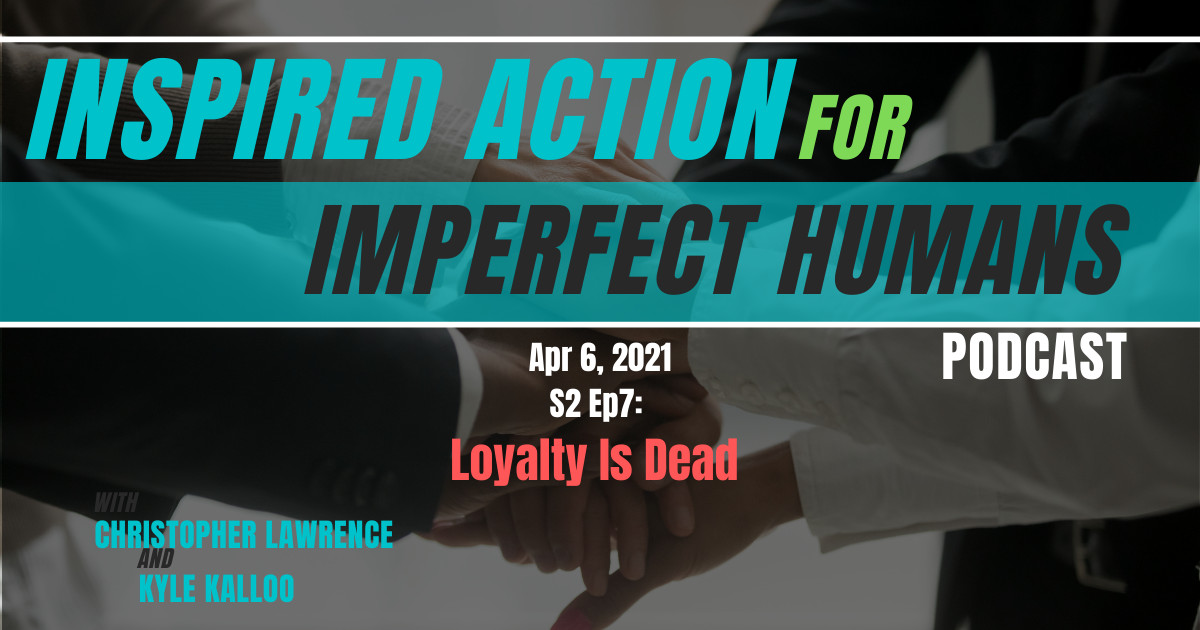Inspired Action For Imperfect Humans – S2EP7: “Loyalty Is Dead”
“Loyalty Is Dead” Brief Summary of Show:
In this episode learn to take inspired action and we ask the question “Is workplace loyalty dead?” Hosts Kyle and Christopher tell a story about loyalty and being loyal to a company, and give some key strategies to find a deeper connection and trust within the workplace.
Calls to Action:
Tell us your “inspired stories” stories by visiting www.InspiredActionPodcast.ca
Christopher Lawrence LinkedIn: https://www.linkedin.com/in/career-life-coach-christopher-lawrence/
Kyle Kalloo LinkedIn: https://www.linkedin.com/in/kyle-kalloo/
Change My Life Coaching & Strategic Leader LinkedIn: https://www.linkedin.com/company/6446498/admin/
Change My Life Coaching: https://changemylifecoaching.ca
Strategic Leader: https://strategicleader.ca
Resources:
https://www.westmonroe.com/perspectives/report/keeping-employees-loyal-in-a-tight-labor-market
“Loyalty Is Dead” Transcript:
Is that loyalty I would say is almost never extended two ways anymore in the workplace
Is the thought of being imperfect keeping you from taking action. Welcome to inspired action for imperfect humans. Each week, we give you real life stories and thought provoking research that inspires your soul to live a more fulfilled life through your own actions from the heart of Calgary Canada. Here are your hosts award winning coaches Christopher Lawrence and Kyle Kalloo.
Hello, Hello.
What’s happening Christopher I’m excited for today. Actually.
My good friend co what do you mean actually?
Well, hang on. Sometimes I’m not always as excited to do these with you, cause you’re usually attacking me and
Oh, wait till you hear today.. wait till you hear today. I have a question for you.
mhmm
Are you ready for this? It’s going to be serious
Oh God
My question is, do you believe that loyalty in the workplace is still a thing? Like, do you believe in loyalty in the workplace?
No, of course. Absolutely.
Really?
Yeah. Why would you say that?
Because it’s like not 1950 anymore.

That’s not to say there’s people in the workplace that’s not loyal because that’s a whole another topic but yeah. Yeah, I think so. I think so. I think loyalty is still important. It’s interesting.
Give me your best… did you?
Yeah, it just, we had a conversation about how people expect loyalty from certain positions certain people, certain individuals, certain..
See I don’t think loyalty is I think loyalty is dead in the workplace, but, and I don’t I don’t think that means that people cannot be loyal.
Okay.
I just think it’s the wrong, it’s the wrong currency. Tell me your best loyalty story.
Here’s the thing I think when someone, I mean cause I know I’m loyal. Like I know to a certain company I know I’m loyal to my company. You know, people always will say, oh here’s the corporate guy because they consider that corporate. It doesn’t mean I’m, I’m an idiot. I’m blind to it. But I think, you know, I know I try to be loyal to you know, the brand, the organization to people. So that means I give them the benefit of the doubt. That means I will engage them in more conversation that allows it to be more dependable. And I expect that to people are loyal to me. They’re they’re going to be dependable. They’re going to be more engaging. And I find that it’s easy for me to trust that.
Hmm. It’s interesting. I.. I, so I’ll tell, I’ll give you two reasons why I think loyalty in the workplace is dead. Okay. I think, I think these are, these are personal stories. So, so I’ve worked for an organization at one point in time in my career that talked a lot about loyalty. I sold my soul to that organization. Like I was loyal. The problem is, is that loyalty I would say is almost never extended two ways anymore in the workplace.
I could see that.
I think it’s almost never, I think that, that we are beholden to shareholders and I don’t think that I don’t know if, if they can, if it’s hard to choose like you look at all of these, these huge organizations where, where, you know, and there’s backdoor deals. We, we know this stuff happens and that’s never going to go away, but you know, these executives get their bonuses, but they got their bonuses because they made their shareholders happy and they made the shareholders happy by laying off a thousand people. Right. Like, so the shareholders kind of, it’s like, okay good, thanks. Like an a cause. Cause that’s who we are beholden to in, in publicly traded companies, right. Is the shareholder. That’s actually the only part, the only group of people that really matter
Verses being loyal to their employees that made all that money or did all those things times are good or bad.
They did the work It’s almost like we made, we make all these money on people’s backs. Right. And then they’re the first people we turn around and then collect on them

Dad works for the same organization for I think it was over 30 years and he was very loyal to them, extremely loyal. You know, he’s a baby boomer. He’s extremely loyal to his organization. This was not even a publicly traded company. Okay. So this was government. He worked with government and a civic government. And I will never forget the day that my dad he early retired because he, his body was so beaten up. His body was so beaten up because he worked so hard. He worked so hard. The expectations were so high and he worked so hard. And, and interestingly enough, my my stepmother also worked for the same organization different department and same thing. Like they put in, like their companies got way more from them than they got from the organization. Right. And, and although good benefits, you know that kind of thing. But it, it wasn’t without, you know, it it was almost punitive. It’s like, well, because you have good benefits you should put in 60 hours a week. I remember my dad saying at the end that that he only claimed half of his overtime and he had something like three or four or six months off at end and he only claimed half.
Wow.
Do you see what I’m saying? And so it’s like, so, so, okay. That’s his choice. Right? I get it. But, but you know what he said to me? Cause, cause shortly after, shortly before that is when I think I started changing my life coaching and he said, Christopher, I wish I had taken more risk like you, because when I look back at it, he said, you know I got this kind of a dope of a manager at the end and it wasn’t worth it. He said, I wish I had taken more risk. I wish I hadn’t been as loyal to this organization. And so he did it because it made economic sense. So that’s not loyalty.
Right.
That’s not loyalty. Right. So I don’t, I think that loyalty I think people can be loyal but I think pandering employers pandering to loyalty is false. Unless that employer is prepared to take a sacrifice like a look at Clive BETOS. Do you remember when we worked at West Jet Clive BETOS there was no profit sharing for a while. Right? So, so there was no bonuses at West Jet. There was no pension at West Jet. There was an employee contribution plan to the shares that was extremely generous. And, and then there was profit sharing, but when the company wasn’t profitable, there was no profit sharing. And so Clive BETOS took $1 for salary. He didn’t want to get paid at all. And, and law says, okay, you can’t do that. He had to take something. So he took $1 a month or a check or something as what he is, what he took. And that was a gesture. And I’m sure he like Clive BETOS was not starving clearly. Like you know, but, but he evoked loyalty.
Yeah. That, that act of loyalty. Also, not only that he voted to, like you were saying for people who are like, wow, that’s great. But also him saying, listen, I’m loyal to my brand the company, the organization, the people within it.
And we all Worked harder because of that. And then he left, I’ll never forget. I was in Europe traveling, using up some of my overtime. I had three weeks of overtime that I built in three months. Like how is that even possible using a mile over time? And he resigned and, and that was it. The culture of the company changed drastically after that. So I don’t think loyalty is real. I think loyalty in the workplace is dead. I think that it’s the wrong focus because I actually don’t think that leaders as well-intentioned, as they are I don’t think that they can pander to loyalty anymore. I don’t think that they can honor loyalty anymore. So anyone who’s expecting loyalty from their employees needs to be loyal. But I think if they look at the hard position that in I don’t think you can be loyal.
Right. And I think that there’s a lesson there actually too even for the, the leaders who are hearing this are saying are you making decisions? Are you banking on loyalty? Is that all you’re banking on? Right. Is that, is that almost an expectation that you have for your people? And then the flip side of that is how are you loyal to the team that you’re leading and the organization, you know, how are you practicing that? So what, what would you say are some of the imperfect you know, or the inspired actions for these, you know for us as imperfect humans?

Well, actually Kyle I wanted to, I looked up some statistics on loyalty. So again, these are, this is, this is, I’m always cognizant of when, when we look at social research, right? Because there’s limitations. How do people answer? How are the questions this came from west Monroe? Okay. So they’re a consulting firm. I suspect that they’re probably like an EPCIS reader or something like that. So this was from 2018 and they surveyed 2000 full-time US employees. And this is what they found now. I think US is very different in terms of loyalty than Canadians are. I also think it’s different in different countries. Like you see documentaries and stuff about places in Eastern Europe where it’s like, like they take care of their people differently than we do here. I, but again, I don’t know if those are just stereotypes because that’s the image that the director wanted to show. You know what I mean? So, so actually this is what came out of that study. So 82% of employees have a high sense of loyalty to their current employers, 82%,
not surprised but, but how do you define loyalty? Because 45% Of those same people have applied to new opportunities after one bad day at an office.
Oh, okay.
So that’s almost half. So, so is that loyalty? So like they’re saying they’re loyal but their behavior does not necessarily
Cause there’s a best before date on that..loyalty
Get this, so so loyalty again how are they defining loyalty amongst this 82%? So I suspect it’s how people self reported. Yes. I’m loyal. Here’s, here’s a more devastating statistic. 59% of those people would leave because of a more appealing offer from a new company. Not because they’re seeking an escape from their current company. So even though they’re loyal if they were made a better offer, 59% so almost 60% of people would leave. Anyway. So is that loyalty?
No.
Yeah.
As we’ve defined loyalty. And as I think, as we understand what we feel loyalty is, no because you know, when I, when you see even when you watch certain movies and you just the other day, I was watching, you know, stories about you know, a civic war and you see people they know they’re going to die. They know that, but they’re doing it because they’re trying to protect their country. They’re trying to do it because they want to create a better life for other people. And they put themselves in harm’s way. Whereas what you just said, the moment I feel resistance or a mode, I feel something is not right. I’ve checked out then I don’t think that’s loyalty. And again, that just seems to be my definition of what we think it is. So I..
Think loyalty is emotionally driven and emotions are not reliable. Emotions come and go. I think loyalty is emotionally driven. And so I think, and it’s based on values, right. But if somebody violates that value, do you keep showing up? Like,
you know, as I think about my early in career and stuff, I’ve done, I did, I still showed up. I didn’t like it. I still, I still showed up
There’s something that says like that to me talks about it. It talks about one of two things. Your either stupid..
Which is highly possible
Is not, it is not, sometimes you’re a piece of **** but you’re not stupid or you’re gritty. Like there, I think there is something enviable about that kind of boomer. And I would say even most of the Xes kind of have that like hard work mentality. I’m not saying that millennials and centennials don’t I’m not saying that at all. And in fact, the research like I don’t really believe in the generational research. I actually don’t think it’s, you know, I think I think that, you know, they say that and it’s like, well what if you had measured the boomers when they were in their twenties versus the greatest generation who would have been older at that? Like, like, yeah
Do have a little bit more on them right? Like, well
That’s a thing, certainly as I have aged, I’ve experienced you know, different things, you know, in my value shift. Okay. So on that note, there is a bit of a statistic from this survey about gen Xes and millennials. So of gen Xers 62% plan to stay at their current employers for five plus years, 62%. Of millennials, 43% plan to stay at their current employers for five plus years. So, so, you know, it’s like, wow millennials look less loyal. But I think there’s a bigger consideration here because the span for millennials is 20 years
Right.
It’s 20 years. So it’s like you have you had some millennials that were already 20 years old when some millennials were being born.
Right.
So I’m considered a millennial. I was born in 1980. Some people say it’s 1978. Some people say it’s 1982. So somewhere in there I kind of fall in. And then there’s this new one that they’re calling which is a shorter time period. People who are in that window where you might’ve used a rotary phone but also used a cell phone. Right. Like as you were right. So in your childhood, you would’ve seen it. So, so, but based off of kind of the millennial stuff, it’s like like I’m 41 years old and I’m a millennial, right? Like based off of the research. So I look at this and I’m like, well some of these millennials are 23. They should not be planning to stay at their employer for five plus years because that is a mark against them in their working careers. Like it’s, this is not a good thing to be 23 and then be 33 and have no diversity in your experience. Like, like it’s like, well, this person’s oil. It’s like, yeah, that’s great. But they might lack diversity. So it actually works against them in some ways.
Right. Right.
Although if I saw more resumes that had people that had stayed at companies for 10 years that would put a smile on my face.
Of course, of course.
No, here’s the other thing more than two in five millennials plan to stay at their current employer for such a significant amount of time suggests that the job hopper stereotype might not hold true.
Okay.
Right. But I look at it and it’s like you have to remember millennials watched their parents go through the eighties when, you know, some, some provinces in Canada hit a hard time and it was like, it didn’t matter. Loyalty was irrelevant. It’s like, you just lost your job. That was it. You just lost your job. That was it. You lost it. Your loyalty stood for nothing. And your loyalty does stand for nothing during hard economic times. I know sometimes they’ll make decision about like, you know this person’s really loyal. Let’s keep them versus this person. I would say when it’s really tough economic times it’s based on salary and you, and I know that because we have seen it happen over and over like who do we coach when they get laid off? It’s the people who were the highest potential highest paid, you know? And, and the people left behind make a pittance in comparison and work their butts off.
And it’s interesting because you wonder why, like when you you know, and this is what’s happening, you know especially I think with the pandemic we’ve seen a lot of that. You know, a lot of people got laid off and the people who are left beyond they feel this thing of the, it’s almost like their loyalty increased because they got to stay but they’re working five times, 50 times as hard, you know? And I think that’s a problem, right? Because to be honest with you, is it guilt? Is it loyalty? Like, it’s something because they’re working like five people because the job still has to get done. The employer didn’t say, okay since we don’t have the 10 people doing this job anymore let’s bring it down. Let’s reorganize it. And let’s just say based on the five people or the three people we have, let’s change it. I find that’s not happening. If anything, you expect the 10 people output which is the problem.
Yep. Totally. So I don’t, I think the jury’s still out Kyle is loyalty dead or in the workplace or is it not? I think the answer is it is. And it isn’t.
Yeah. You, you actually shifted my mindset on that a little bit. I think there’s there’s times where people have good intentions to be loyal, but I think something happens in the organization where they’ve learned that it’s not about them.
So if it was about loyalty, then, then what’s the number one solution in your mind. Cause you’re, you’re a loyal guy.
Yeah. I think the number one thing for me is you gotta be like, trust. You gotta be willing to say, you know if you want to gain trust or you want other people to trust you you have to be trustworthy. I think you have to be you have to practice and behave as someone who is loyal. So when push comes to shove in those moments did you just drink something that didn’t sit right or
sorry.
Or you don’t like what I’m saying
My water tastes funny. Kyle got distracted…. My water tastes funny.
Okay. Okay. Back to
Plebiscite already. Did they add fluoride to the water over the weekend? Because our city, they want to do a plebiscite for Florida in the water. Again, like, again, this is like every five to 10 years we go through the stupid thing. Should we add fluoride to the water
Anyways, back on track, you have to be you have to practice a loyalty. Like you have to, when push comes to shove and you understand why you’re there then it’s about you being someone who exhibits loyalty that you can be trusted and gain you know it’s one thing that we talk about when we, you know, in my in my practice, when we talk to and work with organizations about building trust the number one thing is, is you to be trustworthy, right? You have to display actions that says someone can trust you. So you either do what you say you’re going to do. And so that’s the part of that loyalties you understanding? What does the organization need? What can you contribute to that organization and be loyal to that? How about you? What do you think? What are some other things?
Yeah. So I think it’s, if it’s not about loyalty from my perspective, if it’s not about loyalty then it’s about, I think there’s three things. I think it’s about helping people find a personal connection to why they’re in this organization. So maybe it’s about the paycheck. Maybe it’s about survival but how can we help them go beyond that? Like how can we help them find a deeper connection? There’s actually a great book about this called the dream manager. It’s such an inspirational book and E it’s actually easier than people think to accomplish. So I think first thing is help them find a personal connection or a purpose on working with you. People want to grow number two, create team envy be the leader that people want to follow, make yourself that person, that everyone wants to be on your team. And by the way, folks, that’s not always, and Kyle will tell you this. It is not about just making people happy. It’s actually about holding people accountable accountable, and, and building trust. Right? And that is, that is the at the bottom of the pyramid of the five behaviors of a cohesive team that you facilitate, isn’t it Kyle?
Absolutely
You have to have trust before anything else comes. You cannot get results without trust.
And, and we have stats right. Also that shows that. But think about it, think about it. When someone that you look at your own circle, you know on one hand, how many people you trust and you will actually tell them anything in everything or you’re going to consult your again, involve them. Could you imagine if you had an organization or you’re in a bigger group that you can feel that way with? Wouldn’t that be great? Absolutely.
Totally. And then the third thing I think is that it’s loyalty is not necessarily about paying people money but sometimes what they want is attached to money. So find out what somebody’s currency is. Is it growth as a purpose? Is it independence? You know, as a community, what is somebody’s currency? You know, that goes beyond the dollars. Like yes, money might be a part of it but what is it that goes beyond the dollars? I think those are the three things that I would suggest to our folks that they might consider to take inspired, imperfect inspired action on.
Yeah. So as you guys think about your week, this week thinking about that, what is one thing that you can take inspired action on? What is that one thing? And we’ve often said it again and again in our podcast is not about the, you know, we may have shared three, four or five things with you today, but what is that one thing that you’re saying I’m going to be committed to this week to take inspired action on. And that is how you start at step one. Until next week.
It’s our goal to build a global community of inspired action takers. And we can only do that with your help. So if you love inspired action please leave a review on your favorite podcasting app and share a signer socials you’ve heard from us. Now we want to hear from you go to inspired action podcast.ca and tell us what is the inspired action you took this week next week on inspired action for imperfect humans?
Well, I struggled with it because I had to speak English a certain way. And actually the teacher at the time actually kept me back a year.



